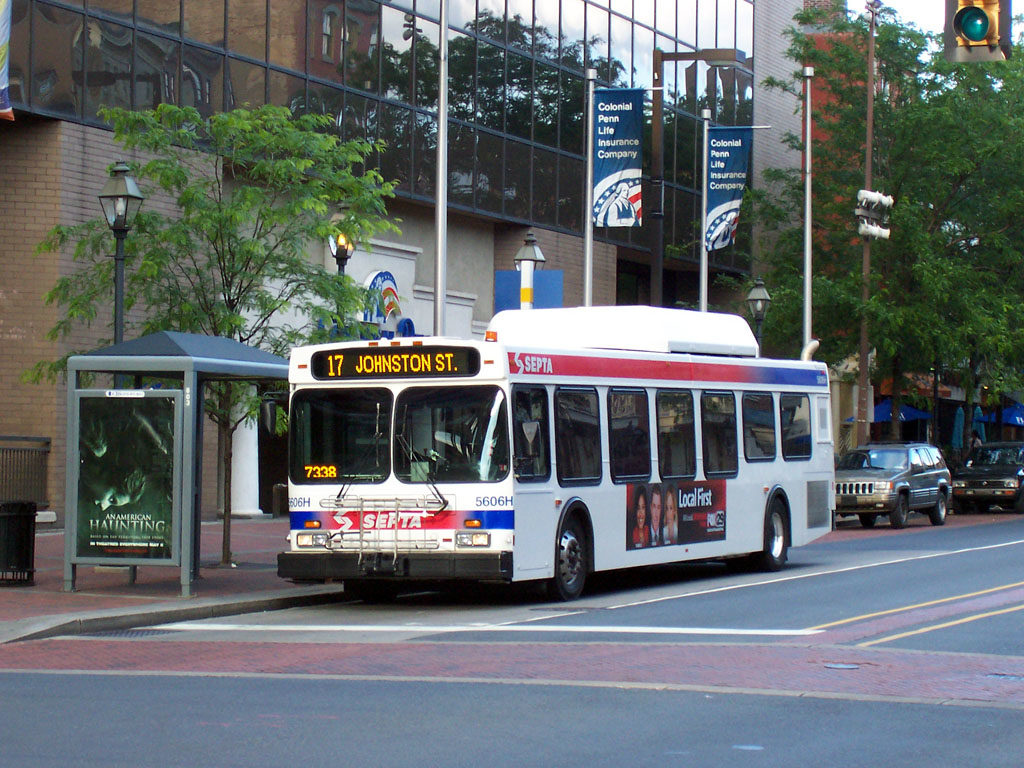Have you been injured while using SEPTA transportation services in Philadelphia? Our guide below covers your rights as a passenger and answers the most frequently asked questions victims have when considering a lawsuit against SEPTA. Here’s some of the most commonly asked questions:
Can I Sue SEPTA For My Injuries If I Am A Passenger?
The Southeastern Pennsylvania Transportation Authority (SEPTA) is the largest transit system in Pennsylvania and the sixth largest in the United States. SEPTA offers individuals many transit services, including the Regional Rail, trolleys, subways, and buses. This public transit service is a great way for people to get around the region. Although a great way to travel around the region, SEPTA sometimes cause injuries to its passengers.
What Happens If I Get Injured on a SEPTA Bus?
If you are a SEPTA bus passenger that is injured due to SEPTA’s negligence, you may be entitled to compensation for your pain and suffering as well as any economic damages such as wage loss and medical expenses incurred. If you do not own a car and do not live with a relative who owns a car, SEPTA will pay for your medical treatment up to $5,000. In order for SEPTA to pay these claims, you will need to complete an application for benefits and affidavit of no insurance in a timely manner, in addition to having reported your injuries promptly. If you have your own motor vehicle, your car insurance will be first priority under the law and will pay for your personal injury accident-related medical treatment even though you were on a SEPTA bus and were not driving at the time of the car accident.
If the bus driver is at fault for your injuries, SEPTA can be responsible for your pain and suffering and economic damages such as lost wages and
medical expenses incurred. If the other car is at fault, we will pursue the negligent driver who caused your injuries. SEPTA bus passengers are deemed to be full-tort under Pennsylvania Motor Vehicle Financial Responsibility Law because one of the exceptions to the limited tort law in Pennsylvania is for those individuals who are passengers in commercial vehicles such as a SEPTA bus. Full tort means there is no limitation to you bringing your lawsuit. This applies even if you have a limited tort auto policy yourself which typically would have limitations.
What Happens If I Get Injured While On SEPTA Regional Rail?

Passengers also use the many train lines of commuting throughout the Philadelphia and the outlying counties. Whether using the Regional Rail or the Subway Lines, it is possible for a train to derail, collide with another train, or even hit an animal, pedestrian, or vehicle on the tracks causing injuries to its passengers. Similar to the bus passengers, rail passengers are deemed to be full-tort under the Pennsylvania Motor Vehicle Financial Responsibility Law.
What to do Following a SEPTA Accident As A Passenger?
Make sure to immediately write down the bus number, route number, time of day and accident location. This information is critical following a SEPTA bus accident as it will enable your lawyer to put SEPTA on notice of your claim and obtain video of the accident. If possible, obtain and write down the name of the SEPTA driver, as well as any other drivers involved in the car accident. If injured while a passenger on the SEPTA bus, make sure that the driver takes down your name and information to transmit to SEPTA on his/her incident form. If possible, write down the names and telephone numbers of any fellow passengers or other witnesses to the car accident. If you have a smartphone, use it to take pictures of the bus, the license plate numbers of all vehicles involved, street signs and anything else you can photograph at the scene of the bus accident. Seek medical attention if you are injured. If you do not have a family doctor, go to your local emergency room. If you have a family doctor contact that physician and ask to be seen that day in order to be evaluated for your personal injuries.
If you or a loved one has been injured involving a SEPTA vehicle, the Thistle Law Firm is experienced in these claims and can help you understand your legal options and answer your questions at 215-568-6800.
Can I Sue If A SEPTA Bus Hits My Car?
The Southeastern Pennsylvania Transportation Authority (SEPTA) is the largest transit system in Pennsylvania and the sixth largest in the United States. SEPTA offers individuals many transit services, including the Regional Rail, trolleys, subways, and buses. This public transit service is a great way for people to get around the region. Although a great way to travel around the region, SEPTA sometimes cause injuries to other car drivers.
How Can I Tell If My SEPTA Accident Was My Fault Or The Bus Drivers?
Just as with any automobile driver, a collision with a SEPTA bus can be caused by the SEPTA driver not paying attention to his surroundings. The SEPTA bus driver could be speeding and not be able to stop in time to avoid striking your lawfully stopped or moving car. The bus driver could be rushing and not stop in time for a red light or stop sign. The bus driver may be changing lanes, not see you, strike your car or cause you to veer away from the bus striking another car or telephone pole. If you are injured while driving or a passenger in a car that is struck by a SEPTA vehicle, your own motor vehicle insurance will provide coverage for your medical treatment. You will be bound by the tort option you selected when you purchased your motor vehicle insurance policy. This will be either a limited or full tort option. If you selected the full tort option, regardless of the extent of the injury or damages, you will able to assert a claim for pain and suffering – so long as the accident was not your fault. Someone with full tort coverage is not obligated to first demonstrate that they received a serious injury from the accident before they can recover damages for pain and suffering. Because there is no threshold which must first be met, someone with full tort coverage can automatically assert a claim with their insurance provider for all of the losses they experienced from the accident, such as damages to the vehicle, medical bills, etc. – not just the out-of-pocket costs. The limited tort option is the opposite. Limited tort permits someone injured in a car accident to only recover for their out-of-pocket medical bills, wage loss, automobile repair costs, and other actual monetary loss. When someone elects to have limited tort insurance coverage, they are foregoing the right to pursue damages in a personal injury claim for pain and suffering and other similar damages, even in situations where they are not at fault unless they meet certain exceptions which are explained in another blog.
Can I Sue A SEPTA Bus for Hitting Me While a Pedestrian?
The Southeastern Pennsylvania Transportation Authority (SEPTA) is the largest transit system in Pennsylvania and the sixth largest in the United States. SEPTA offers individuals many transit services, including the Regional Rail, trolleys, subways, and buses. This public transit service is a great way for people to get around the region. Although a great way to travel around the region, SEPTA sometimes cause injuries to pedestrians.

If I Was Hit By A SEPTA Vehicle As A Pedestrian How Can I Tell Whether It Was My Fault Or The Bus Drivers?
There are occasions when a pedestrian is injured by SEPTA due to the negligence and carelessness of its driver. The bus driver may not stop in time as it approaches a red light at a crosswalk. The bus driver may be making a turn to close to the sidewalk and strike a pedestrian with its side mirror. As an injured pedestrian, you are not bound by your tort selection from your automobile insurance coverage. The Pennsylvania Supreme Court held that the minor pedestrian should not be restricted by her mother’s election of the limited tort alternative because her injuries did not result from the use of a motor vehicle, either as an operator or an occupant. Therefore, a pedestrian’s election of limited tort on their auto insurance policy has no effect on his legal right to sue the at-fault driver for pain and suffering damages.
Typically, if you selected the full tort option, regardless of the extent of the injury or damages, you will able to assert a claim for pain and suffering – so long as the accident was not your fault. Someone with full tort coverage is not obligated to first demonstrate that they received a serious injury from the accident before they can recover damages for pain and suffering. Because there is no threshold which must first be met, someone with full tort coverage can automatically assert a claim with their insurance provider for all of the losses they experienced from the accident, such as damages to the vehicle, medical bills, etc. – not just the out-of-pocket costs. The limited tort option is the opposite. Limited tort permits someone injured in a car accident to only recover for their out-of-pocket medical bills, wage loss, automobile repair costs, and other actual monetary loss. When someone elects to have limited tort insurance coverage, they are foregoing the right to pursue damages in a personal injury claim for pain and suffering and other similar damages, even in situations where they are not at fault unless they meet certain exceptions which are explained in another blog.
Can I Sue SEPTA For My Injuries?
The Southeastern Pennsylvania Transportation Authority (SEPTA) is the largest transit system in Pennsylvania and the sixth largest in the United States. SEPTA offers individuals many transit services, including the Regional Rail, trolleys, subways, and buses. This public transit service is a great way for people to get around the region. Although a great way to travel
around the region, SEPTA sometimes cause injuries to its passengers and pedestrians. As a result, SEPTA has installed surveillance cameras on its vehicles. These videos are often quite helpful to prove how the injury occurred and the type of injury suffered by the injured party. SEPTA will use many defenses to avoid responsibility for the many real injuries of an injured passenger or pedestrian. These defenses include sovereign immunity, not receiving timely notice of the injury, or the jerk and jolt doctrine.
What Are SEPTA’s Immunity and Legal Requirements in Pennsylvania?
SEPTA is a government agency and is entitled to sovereign immunity under the law. While SEPTA does not enjoy immunity with regard to bus accidents that occur due to its negligent operation, the damages an injured person can recover is limited to $250,000. Also, an individual injured as a result of SEPTA’s negligence must provide notice to SEPTA within 6 months of the date of the injury. SEPTA has a claims form that it asks those injured as a result of a SEPTA accident to complete and submit. If you do not provide timely notice you may be unable to pursue a claim for personal injuries.
Do SEPTA Vehicles Need To Be In Operation When An Accident Or Injury Occurs?

Additionally, SEPTA is only liable for injuries that occur with respect to the negligent operation of its vehicles. In other words, the courts have held that in order to recover against SEPTA, your injuries must have been caused by SEPTA’s actual operation of its vehicles. The courts have further held that to operate means to put in motion. Preparing to operate a vehicle or acts taken once the vehicle has come to a complete stop are not the same as operating a vehicle, and courts have consistently rejected lawsuits filed by passengers injured on SEPTA buses that were not “operating” at the time. For example, Pennsylvania courts have granted SEPTA immunity on the basis that SEPTA was not “operating a vehicle” in the following circumstances:
SEPTA bus rear-ended while it was stationary and loading/unloading passengers;
SEPTA driver did not “kneel” bus properly while it was not in motion for the passenger to exit;
Wheelchair ramp was uneven with the ground after being lowered and passenger injured using the ramp.
What Is The “Jerk and Jolt Doctrine”?
Another defense used by SEPTA to prevent payment to injured passengers is the Jerk and Jolt doctrine. This defense comes into play when a passenger is injured after the bus stops or starts suddenly. This common defense used by SEPTA prohibits an injured passenger from recovering money from SEPTA unless the jerk or jolt that caused the injury was “extraordinary.” But the
definition of “extraordinary,” of course, is open to interpretation. Our state Supreme Court has repeatedly held that “extraordinary” means uncommon and unexpected. The Supreme Court has also held that the jerk or jolt that caused the injury must have affected more passengers than just the injured person; however, there are exceptions to this rule too.
What Should You Do Following a SEPTA Accident in Pennsylvania?
Make sure to immediately write down the bus number, route number, time of day and accident location. This information is critical following a SEPTA bus accident as it will enable your lawyer to put SEPTA on notice of your claim and obtain video of the accident. If possible, obtain and write down the name of the SEPTA driver, as well as any other drivers involved in the car accident. If injured while a passenger on the SEPTA bus, make sure that the driver takes down your name and information to transmit to SEPTA on his/her incident form. If possible, write down the names and telephone numbers of any fellow passengers or other witnesses to the car accident. If you have a smartphone, use it to take pictures of the bus, the license plate numbers of all vehicles involved, street signs and anything else you can photograph at the scene of the bus accident. Seek medical attention if you are injured. If you do not have a family doctor, go to your local emergency room. If you have a family doctor contact that physician and ask to be seen that day in order to be evaluated for your personal injuries.
If you or a loved one has been injured involving a SEPTA vehicle, the Thistle Law Firm is experienced in these claims and can help you understand your legal options and answer your questions at 215-525-6824.

